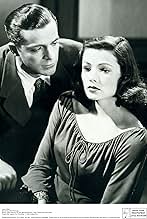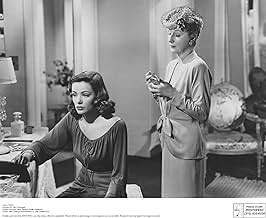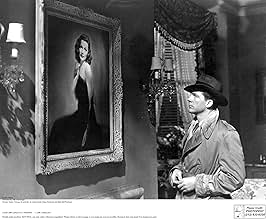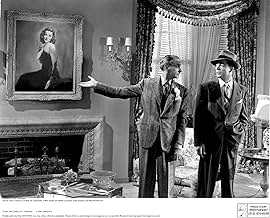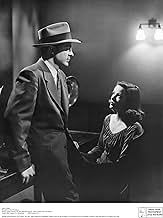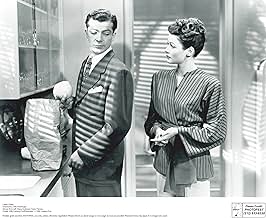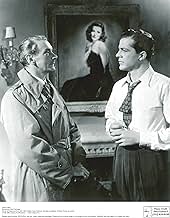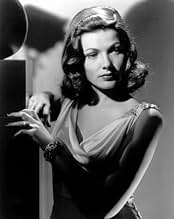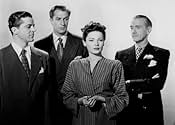Ein Polizeibeamter verliebt sich in die Frau, deren Mord er untersucht.Ein Polizeibeamter verliebt sich in die Frau, deren Mord er untersucht.Ein Polizeibeamter verliebt sich in die Frau, deren Mord er untersucht.
- 1 Oscar gewonnen
- 7 Gewinne & 5 Nominierungen insgesamt
Grant Mitchell
- Lancaster Corey
- (Gelöschte Szenen)
Dorothy Adams
- Bessie Clary - Laura's Maid
- (Nicht genannt)
Terry Adams
- Woman
- (Nicht genannt)
John Alban
- Executive
- (Nicht genannt)
Wally Albright
- Newsboy
- (Nicht genannt)
Bobby Barber
- Newsboy
- (Nicht genannt)
Edward Biby
- Party Guest
- (Nicht genannt)
Gary Breckner
- Narrator
- (Nicht genannt)
James Carlisle
- Party Guest
- (Nicht genannt)
Harry Carter
- Party Guest
- (Nicht genannt)
Lane Chandler
- Detective
- (Nicht genannt)
Bill Chaney
- Newsboy
- (Nicht genannt)
Dorothy Christy
- Woman
- (Nicht genannt)
Empfohlene Bewertungen
'Laura' is one of the most entertaining mystery movies I've ever seen. A mystery? Also a romance, a Film Noir and even in some ways a comedy. It's quite a unique movie from the legendary Otto Preminger, who took over from the original director and started from scratch. Gene Tierney plays the title character, a woman who seems to bewitch every man she meets. It's no wonder because Tierney is mesmerizing to watch. I think she could well be the most beautiful actress of all time. Dana Andrews, Vincent Price and Clifton Webb play the three men in Laura's life. Andrews ('Night Of The Demon') plays a detective investigating Laura's apparent murder, Price, years before becoming a horror icon, a gigolo type who is due to marry her, and Webb (best known as Mr. Belvedere) is a snobby columnist and wit who is Laura's mentor. All four actors are just terrific and the plot is full of twists and surprises. I enjoyed this movie from start to finish. 'Laura' is one of the very best Hollywood movies of the 1940s. Highly recommended
LAURA is, quite simply, as good as it gets as far as "film noir" is concerned.
Aside from an interesting story, a witty script, excellent B&W photography of elegant sets and the beautiful Gene Tierney as the center of attention, it works on every level imaginable. Dana Andrews has an intriguing role as the detective drawn to the portrait of Laura after believing her dead. And Clifton Webb has his star-making role of Waldo Lydecker, the snobbish and elegant man who seems just as obsessed with the dead woman as the detective. Adding to the impressive performances are Judith Anderson and Vincent Price.
The only flaw seems to be that Laura herself is not as well-defined in motives and background as the other players. But Gene Tierney's mesmerizing beauty hardly makes that important. Nevertheless, she is too passive in the role and actually gave far stronger performances in films like The Razor's Edge and Leave Her to Heaven, something she herself admitted--but her looks were never used to better advantage.
With several plot twists and turns, it keeps you thoroughly absorbed until it reaches its satisfying climax under Otto Preminger's knowing direction. Not to be missed, it's a classic of its kind.
For a detailed look at the career of DANA ANDREWS, see my current article on him in FILMS OF THE GOLDEN AGE, Summer 2001 with a look at all of his films and many photos.
Aside from an interesting story, a witty script, excellent B&W photography of elegant sets and the beautiful Gene Tierney as the center of attention, it works on every level imaginable. Dana Andrews has an intriguing role as the detective drawn to the portrait of Laura after believing her dead. And Clifton Webb has his star-making role of Waldo Lydecker, the snobbish and elegant man who seems just as obsessed with the dead woman as the detective. Adding to the impressive performances are Judith Anderson and Vincent Price.
The only flaw seems to be that Laura herself is not as well-defined in motives and background as the other players. But Gene Tierney's mesmerizing beauty hardly makes that important. Nevertheless, she is too passive in the role and actually gave far stronger performances in films like The Razor's Edge and Leave Her to Heaven, something she herself admitted--but her looks were never used to better advantage.
With several plot twists and turns, it keeps you thoroughly absorbed until it reaches its satisfying climax under Otto Preminger's knowing direction. Not to be missed, it's a classic of its kind.
For a detailed look at the career of DANA ANDREWS, see my current article on him in FILMS OF THE GOLDEN AGE, Summer 2001 with a look at all of his films and many photos.
Laura is a wonderful example of film noir. The cast is perfect. Dana Andrews is the detective assigned to investigate the murder of Laura (played by Gene Tierney). As he interviews her associates and becomes mesmerized by her portrait, he begins to fall for Laura posthumously. Clifton Webb plays her mentor perfectly and Vincent Price is classic as Laura's pretty boy fiance. Although the movie begins with Laura's murder, it still has incredible surprises and an awesome denouement. Andrews hard boiled detective and the dark, raining sets illustrate the meaning of film noir. I highly recommend it.
I'm not sure if "Laura" truly qualifies as a film noir, although it certainly looks the part. If anything, it is a bridge between the standard romantic dramas of the '30s and '40s and the far darker truly noir films, such as "Double Indemnity," in which the main characters are either weak, desperate, or truly evil.
Tierney, here, is luminous as always, but hardly unsympathetic. And Andrews is your basic Dick Tracy -- colorless, but solid and honest. It's no surprise then that Webb walks off with the film, but his character is significant in other ways. Outwardly fey, Waldo is a variation on the stock "gay" Hollywood character seen at a time when homosexuality was hinted at but never really acknowledged. He insists he loves Laura, but there appears to be no actual love affair. He chooses her clothes and hairstyles, shows her off on his arm, but never seems to have any real physical contact with her. (The visual clue is his apartment, filled with pretty things that no one is allowed to touch, although Waldo will gladly tell you how expensive they are.) His scenes with Andrews become far more complex in this context, particularly when he discusses the case with the detective from his bath. Their verbal sparring continues throughout the film, and Webb makes frequent remarks about why women find Andrews' type so alluring, while they reject more "refined" males of taste and breeding. But Webb's Waldo, despite the refinement, is a catty and cruel little monster, a man who writes of love, but has none in his life. Unlike David Wayne's comic sissy in "Adam's Rib," who repeatedly proclaims his love and adoration for Katharine Hepburn's Amanda, Webb's Waldo has an edge so vile that we fear him, and, because of that, can accept him as a suspect.
The film is also notable for Vincent Price's performance as a needy boy-toy who is manlier than Webb, but still sexually vague, indecisive and weak. Viewers unaccustomed to seeing Price in such roles may think he was miscast. Perhaps he was, but he seems to be doing precisely what he was supposed to do, giving Laura another worldly but inappropriate suitor.
The plot, predictable or not, is great fun; a bit of a whodunit with a psychological edge. The score is legendary, and like the painting Andrews falls in love with, the music gives the film its haunting quality, particularly at those moments when we segue into another flashback.
There's a bit of inscrutability in most of Tierney's performances, which makes her perfect for this role. We rarely know what she's thinking, or precisely how she feels about the other characters. And because of this, her flashbacks provide few clues as to why anyone would want to murder her.
There are a few other suspects, of course, including the great Judith Anderson, and there's even a smart little cocktail party where you can look them over one more time. As for who really did kill Laura -- well, good luck with that one.
Tierney, here, is luminous as always, but hardly unsympathetic. And Andrews is your basic Dick Tracy -- colorless, but solid and honest. It's no surprise then that Webb walks off with the film, but his character is significant in other ways. Outwardly fey, Waldo is a variation on the stock "gay" Hollywood character seen at a time when homosexuality was hinted at but never really acknowledged. He insists he loves Laura, but there appears to be no actual love affair. He chooses her clothes and hairstyles, shows her off on his arm, but never seems to have any real physical contact with her. (The visual clue is his apartment, filled with pretty things that no one is allowed to touch, although Waldo will gladly tell you how expensive they are.) His scenes with Andrews become far more complex in this context, particularly when he discusses the case with the detective from his bath. Their verbal sparring continues throughout the film, and Webb makes frequent remarks about why women find Andrews' type so alluring, while they reject more "refined" males of taste and breeding. But Webb's Waldo, despite the refinement, is a catty and cruel little monster, a man who writes of love, but has none in his life. Unlike David Wayne's comic sissy in "Adam's Rib," who repeatedly proclaims his love and adoration for Katharine Hepburn's Amanda, Webb's Waldo has an edge so vile that we fear him, and, because of that, can accept him as a suspect.
The film is also notable for Vincent Price's performance as a needy boy-toy who is manlier than Webb, but still sexually vague, indecisive and weak. Viewers unaccustomed to seeing Price in such roles may think he was miscast. Perhaps he was, but he seems to be doing precisely what he was supposed to do, giving Laura another worldly but inappropriate suitor.
The plot, predictable or not, is great fun; a bit of a whodunit with a psychological edge. The score is legendary, and like the painting Andrews falls in love with, the music gives the film its haunting quality, particularly at those moments when we segue into another flashback.
There's a bit of inscrutability in most of Tierney's performances, which makes her perfect for this role. We rarely know what she's thinking, or precisely how she feels about the other characters. And because of this, her flashbacks provide few clues as to why anyone would want to murder her.
There are a few other suspects, of course, including the great Judith Anderson, and there's even a smart little cocktail party where you can look them over one more time. As for who really did kill Laura -- well, good luck with that one.
A superbly stylish movie. None of its characters is without flaws - even the elusive Laura is too naive for her own good. They are presented lovingly by Preminger, and his award-winning DOP Joseph LaShelle.
The excellent script ranges from caustic Laedecker/Webb put-downs, through brutal Treadwell/Anderson self-assessment, to laconic MacPherson/Andrews minimalism.
The score is, of course, a classic. Raksin's sinuous melody, brilliantly deployed, haunts the picture as powerfully as Laura's portrait haunts Detective MacPherson.
The central performances are wonderful, not least because of the perfect casting. Tierney shines as the enigmatic title character: beautiful, intelligent, somehow both cool and passionate at the same time. Webb dazzles, Price slithers, Anderson simmers. Best of all is Andrews as the detective who barely opens his mouth when he speaks, and on whose face desire barely flickers - but he does enough to show you exactly what he wants and how he feels. It's a great movie performance from an underrated actor. Only Dorothy Adams doesn't quite fit, in a role - Laura's maid - that could easily have been as showy as the others with the right performer.
LAURA doesn't appear to be about anything significant, but it leaves behind it a feeling that it is greater than the sum of its parts. I don't know how this was managed, and perhaps no-one involved in it did either. It's one of those movies where everything just clicked. Seeing it again recently, after many years, confirms its status for me as a significant work, but exactly why or how remains as much of a puzzle as Laura herself.
The excellent script ranges from caustic Laedecker/Webb put-downs, through brutal Treadwell/Anderson self-assessment, to laconic MacPherson/Andrews minimalism.
The score is, of course, a classic. Raksin's sinuous melody, brilliantly deployed, haunts the picture as powerfully as Laura's portrait haunts Detective MacPherson.
The central performances are wonderful, not least because of the perfect casting. Tierney shines as the enigmatic title character: beautiful, intelligent, somehow both cool and passionate at the same time. Webb dazzles, Price slithers, Anderson simmers. Best of all is Andrews as the detective who barely opens his mouth when he speaks, and on whose face desire barely flickers - but he does enough to show you exactly what he wants and how he feels. It's a great movie performance from an underrated actor. Only Dorothy Adams doesn't quite fit, in a role - Laura's maid - that could easily have been as showy as the others with the right performer.
LAURA doesn't appear to be about anything significant, but it leaves behind it a feeling that it is greater than the sum of its parts. I don't know how this was managed, and perhaps no-one involved in it did either. It's one of those movies where everything just clicked. Seeing it again recently, after many years, confirms its status for me as a significant work, but exactly why or how remains as much of a puzzle as Laura herself.
Wusstest du schon
- WissenswertesAccording to Producer and Director Otto Preminger, he had to work to win the respect of the cast, who all seemed "hostile" to him when he took over, with the exception of Clifton Webb. "I learned later", he said, "that Mamoulian had called each of them individually and warned them that I did not like their acting and intended to fire them." It was not true. Dame Judith Anderson decided to confront him on the set. She said that if he wasn't happy with her performance, then he should show her how to make it better.
- PatzerIn the initial long-shot when McPherson and Lydecker are out to dinner, McPherson's chair is unoccupied (about 15:28). When the camera is at their table, McPherson has materialized.
- Zitate
Waldo Lydecker: I don't use a pen. I write with a goose quill dipped in venom.
- Alternative VersionenA scene cut from the theatrical version after its initial release was restored to the film in 1990. In it, Waldo Lydecker described how he transformed Laura's appearance and introduced her to high society. The studio worried that this obsession with decadent luxury would be offensive to WWII soldiers serving overseas, so the scene was deleted.
- VerbindungenFeatured in Vicki (1953)
Top-Auswahl
Melde dich zum Bewerten an und greife auf die Watchlist für personalisierte Empfehlungen zu.
Details
Box Office
- Budget
- 1.020.000 $ (geschätzt)
- Weltweiter Bruttoertrag
- 1.356 $
- Laufzeit
- 1 Std. 28 Min.(88 min)
- Farbe
- Seitenverhältnis
- 1.37 : 1
Zu dieser Seite beitragen
Bearbeitung vorschlagen oder fehlenden Inhalt hinzufügen


